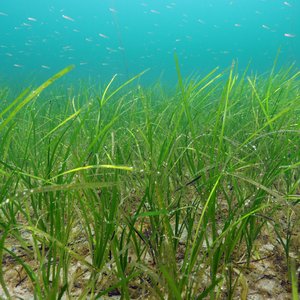The NORSE project focuses on eelgrass meadows, which are important coastal ecosystems that are threatened by intensive human activity.
Eelgrass (Zostera marina) meadows are found in shallow coastal waters across northern Europe and support many critical ecosystem services such as carbon storage, coastal protection, and high biodiversity from epiphytic algae to grazing inverterbrates to small fish to large commercially-important species such as cod and salmon. Seagrass meadows are in decline around the world, and eelgrass meadows in Northern Europe are threatened by many human activities, including eutrophication, overfishing, and climate change.
The goal of the NORSE project is to understand the anthropogenic and environmental drivers of eelgrass-associated biodiversity in Northern Europe, through a combination of historical data analysis, field sampling, and mesocosm experiments across the Skagerrak-Kattegat-Baltic Sea region. NORSE focuses on invertebrate diversity in eelgrass meadows. Though small, these invertebrates play important roles in the eelgrass ecosystems. They are a critical link in the trophic network and essential in ensuring the health of eelgrass ecosystems, as they ensure good ecosystem functioning by controlling the overgrowth of filamentous algae caused by nutrient enrichment.
In recent years, efforts have increased to improve the status of seagrass meadows around the world, with many conservation and restoration projects underway. NORSE will identify the critical drivers of eelgrass meadows and their biodiversity. These results will contribute to ensuring that eelgrass meadows can continue to thrive under future environmental conditions and for planning restoration and management actions that can revitalise degraded and lost eelgrass meadows across Northern Europe.
Published: 15.08.2024
Updated: 07.10.2024


